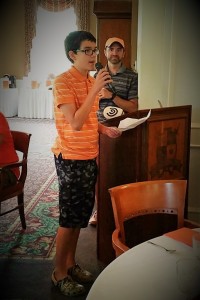Some of us are shy or introverted, so you won’t see us giving a speech in front of a group, or leading discussions in a group setting. But we can still communicate. We understand what other people are saying to us. We can physically hear them. We can then reply, whether that is non-verbally by nodding our head, or by using our voice to respond. Unfortunately, this basic exchange of information, this essential human connection, is not always a reality for many families. They don’t know if their child can understand or hear them. Or they don’t know if the child is able to communicate their needs in return.
When my son was 2 years old, I was fortunate enough to know that he could hear and understand me. He would turn his head at the sound of his name or get his shoes when I said we were leaving. Yet he couldn’t verbalize what his needs were, and by age 2, we should have been well on our way to that. We improvised of course. He would show me his cup or the snack cupboard when he was hungry or thirsty. He would hand me a toy that wasn’t working or that he wanted me to play with along with him. But other times, when we weren’t in a familiar surrounding or when I didn’t understand what he was trying to show me, he became so frustrated. Often, he would give up or withdraw. It was one of the most heartbreaking experiences of my life.
We were so lucky. We found early intervention and tackled these issues head on, with full force. We knew he could physically make sounds, so it was just turning those sounds into the right words. We immersed him in speech therapy and educated ourselves on how to help him learn to communicate, a skill that comes naturally to many, just not to him.
Today that non-talker is 14 years old. He is in the school play next month and singing in a band. I am the Mom you will see at school plays and concerts, with joyful tears in her eyes because I know how far he has come and how important communication is. We are so fortunate that he is able to express himself to the world around him now.
My wish is that every family gets that same opportunity and feels that same joy. It might not be vocal communication, it might be sign language, an iPad, or a hearing aid. Whatever it takes to communicate, to get that connection. The Orange Effect foundation is here for just that. If you can help by donating that is great, but as importantly, if you know a family struggling, encourage them to apply for funding.


